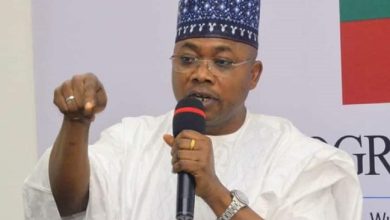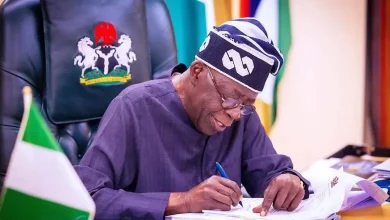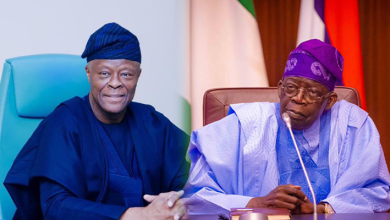COVID-19: Only Buhari Can Decide When Churches, Mosques, Schools Will Reopen – PTF

Members of the Presidential Task Force on COVID-19 (PTF), on Sunday, met with President Muhammadu Buhari at the Presidential Villa, Abuja.
At the end of the meeting, the chairman of the task force, Boss Mustapha, spoke to journalists on their meeting with the president.
Mr Mustapha, who is the Secretary to the Government of the Federation, said the PTF has made recommendations to the president on whether or not schools, religious houses and others should be reopened.
He did not disclose the PTF’s recommendations but said only the president could make a final decision on such matters.
Read excerpts of the interview below.
SGF: What we basically did was to submit the fourth interim report to him and to appraise him of the progress that has been achieved in the course of the last two weeks of the extension of the eased phase one of the lockdown and also discuss some of the challenges that we’ve had and suggested what we need to put in place, going forward.
As far as the work of the PTF is concerned, he was upfront with his commendation and assured us that the nation is fully behind us in the work that he has charged us to do and that he’s also appreciative of the work of the frontline workers, particularly the medical personnel, the security personnel and the people who come in contact with the patients in the time of collection of samples, the testings, the care that they are giving.
We also discussed the issue of compliance and he said we should continue to appeal to Nigerians and drive home the point that it’s a personal responsibility for each and every Nigerian to undertake to ensure that he keeps himself safe and by extension keeping his family, loved ones and community safe.
We will continue to drive that message. It’s a message of persuasion, it’s a message that should make people take personal responsibility for their own protection and health and we will not relent on that.
Q: Kogi and Cross River states are not in tune with the present reality, they are failing to cooperate with the NCDC. Has that come up in your discussions?
SGF: We discussed challenges generally and I believe that in the context of those discussions, certain steps will be taken. We are doing everything to ensure that the entire nation is on the same page with one response and it is very important that we realise that no state is an island unto itself, when you deal with public health matters.
Whatever happens in a particular locality has the consequences of spilling off to other constituencies. That is the message that we’ll continue to drive in our pursuit of getting everybody to be on board and I can assure you that there’s no island that exists as far as COVID-19 is concerned in this country. We must integrate all the responses from the different segments of the community and the state and have everybody to be on the same page. We will continue to pursue that and we must also ensure that it happens. I can assure about that.
Q: Some states have reopened worship centres saying prayers are critical in containing the disease. How do you feel about that?
SGF: That’s part of what we have considered in its totality. We’d await Mr President’s on that, once I receive his approval, going forward, to certain recommendations we have put in place, we will how that happens. The issue of easing up, you know we are in the first phase, we had an extension of two weeks for the first phase, the next phase should be the second phase and along with that will come in with a lot of recommendations, which we expect Mr President to consider.
But I can assure you about one thing, that the ownership of the next stage will be the responsibility of the states and the national supervision and coordination because we have gone into community transmission. Where are the communities? The communities are in the states. So the ownership of the next stage will be the responsibility of the states, the local government, the traditional institutions, the religious leaders at the different levels of our communities because that is where the problem is.
Like we’ve kept saying, 20 local governments, out of 774, account for 60 per cent of confirmed cases in Nigeria today. So where are these 20 local governments? They are in communities. It means we have reached the apex of community transmission and we must get the communities involved.
So the issues of places of worships, the issues of schools, the issues of some certain businesses that were not opened hitherto are part of the packages that we have looked at and we’ve made the appropriate recommendations, but you know that Mr President is the only one that can take decisions in respect of that.
In the framework, the states are subnationals, they have their own responsibilities too, so it is in the exercise of those responsibilities that they had meetings with those religious bodies and agreed on the guidelines and protocols on how they open up, but in the framework of the national response we are taking that into consideration.
Q: Is Nigeria winning this fight against COVID-19, considering the rate of infections?
SGF: We are winning. As a matter of fact, you juxtapose the rate of cases with our fatality rate, which is basically about 3 per cent. In other countries and other climes, it’s over 10%, but the most important thing that you will realise when we started this exercise, we had only five testing stations. Now we’ve ramped it up to 28, without correspondent increase in the number of deaths. We’ve gone beyond 60,000 now, that reflects in the number of confirmed cases
We’ve not reached the peak yet and I won’t want to fool Nigerians by telling them that we are out of the woods. No, we are not out of the woods. As we even open up and accommodate more enterprises, because we are trying to have a balance between livelihoods and life, there’s a likelihood of increase in transmission in cases.
But that should not be a source of despair. Like we’ve always said, the experts will tell you over 80 per cent will contact coronavirus and will not even notice that they have and that accounts for what is happening at the isolation centres when you see young men saying they are not sick and asking why they are being kept there. They are asymptomatic, they don’t show symptoms and they will ware it out.
There’s a 20 per cent that is critical by virtue of certain factors, indices: age, underlying health conditions and vulnerability. That’s the percentage we are trying to protect and if we don’t do something in terms of management, in terms of putting in non-pharmaceutical intervention and guidelines to protect that 20%, about 5% of them can fall critically ill and eventually become fatalities in the numbers and that’s what we are trying to avoid.
So everything we are emplacing is to ensure we protect this vulnerable 20%. 80% will wear it out so the figure isn’t a thing of major concern. Yesterday when I saw the 553 I called the governor of Lagos, I thought he was going to be under intense pressure, but surprisingly he said no, that it was expected because testing has been ramped up and as you ramp up your testing, it reveals what is happening in your community that prepares better for the kind of management care you will put in place.
We are not worried about it as to whether the numbers will increase? They will increase.
Q: Is there hope if opening the economy soon?
We have started, even in the first phase and the extension that came with it. Essential parts of the economy was opening up by way of allowing agricultural production, people that produce fertilizers. The oil and gas industry was never closed for one day and some aspects of the financial sector was opened. After we receive Mr President’s approval tonight or tomorrow morning, we will now know which segment of the economy he has allowed to open.




